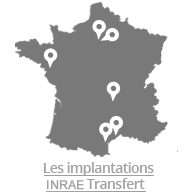Biomass For the Future (BFF) is one of the 8 winning projects chosen in the second call for Biotechnology and Bioresources projects in the Health and Biotechnology excellence category of the Investments in the Future programme.
The BFF project is led by the Jean-Pierre Bourdin Institute (IJPB) at the INRA centre in Versailles-Grignon, one of the largest European research institutes in the field of plant biology. The project pools the skills and expertise of 22 partners (9 public laboratories, 1 technical institute, 10 SMEs and large groups working in biotechnology, agronomy, seed, construction composites and materials, and 2 urban municipalities) which are required to design and implement an infrastructure to support the production and industrial use of miscanthus and sorghum biomass in the pioneering communities. BFF aims to tackle the environmental and social issues surrounding the production and use of biomass to foster the development of tomorrow's green industries:
- Develop crops intended for non-food biomass in France by creating new varieties and farming systems for miscanthus (northern France) and sorghum (southern France) which have a low environmental impact and suitable composition for industrial applications; and
- Structure the entire industrial value chain for the biomaterials and bioenergy sectors by promoting the organisation of production systems at the local level with the participation of industrial firms and stakeholders in the regions concerned.
The project proposes innovative multidisciplinary approaches that combine modelling and systems biology to characterise the architecture, metabolism and composition of the plants best suited to biomass production. The project will help to reclaim 'marginal' farmland and to develop new, local green economies while involving all the stakeholders in a given geographical area.
Contact information :
Coordinator : Herman Höfte - herman.hofte@inra.fr
Project manager : Laure Trannoy - laure.trannoy@inra.fr
www.biomassforthefuture.org






